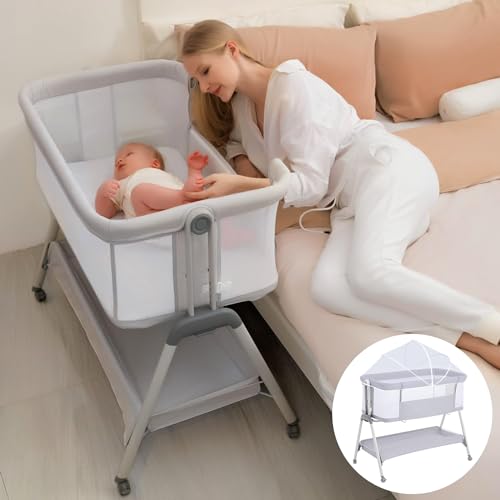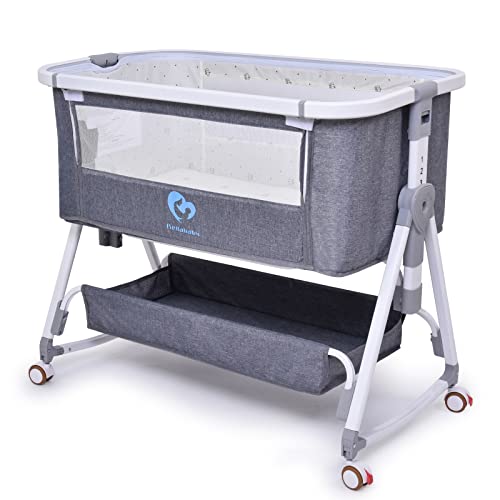10 Things That Your Family Taught You About Bedside Crib To Cot
Mohammad
0
3
01.08 09:54
 Transitioning From Moses Basket to Co-Sleeper
Transitioning From Moses Basket to Co-SleeperA bedside crib, or co-sleeper allows your baby to sleep safely near your bed. Many have extra features like rockers and music.
The Shnuggle Air comes with a cot mattress and conversion kit, which transforms your child's safe, cozy sleeping space into an elegant cot. This innovative feature was a huge hit with our mom testers.
Sleeping bag
Baby sleeping bags provide the same level of comfort as a blanket but without the risks. These bags are an excellent choice for parents who are looking to transition from the Moses basket to a crib or cot. The sleep sacks have been designed with safety and strict European standards in mind. They also allow parents to engage with their infant throughout the night, fostering bonds and closeness. This is vital for encouraging healthy sleeping patterns and developing brain connections.
The majority of experts agree that a crib by the bed is the most secure spot for your baby to sleep. It's important to keep in the mind that your baby becomes more mobile after six months. They'll be able to crawl, roll, and then sit up at night and during naps. This makes it more important to move your baby from the moses basket to an appropriate cot at the right time for them.
At around four months, babies who are at this stage are ready to step out of their moses baskets into a cot/cradle. But, it all is dependent on the child's age. Signs that your baby is ready include rolling over during their sleep and pushing up on their arms while lying on their stomachs and getting uncomfortable in their bassinet.
It is important to choose a sleeping bag that is fitted well and is neither too tight nor too loose. It is crucial to select the correct tog that is appropriate for your baby's body temperature. You can also change it when the weather changes. Keep blankets tucked in because they can block the baby's breathing, causing overheating.
Once your baby is comfortable in their cot, ensure that they're not close to any source of heat like radiators or sunlit windows. Make sure that all baby monitors and curtains cables are away from reach. Be aware that your baby isn't as able to regulate their temperature than you are, so they'll be more prone to overheating.
Blankets
Baby blankets are a charming accessory to any cot or bedside crib with changing table table and it's normal for parents who are new to cover their child with a cozy blanket when they go to sleep. However, using a blanket in a crib is not suitable for infants and may increase the danger of SIDS, suffocation or an entrapment. The best choice is a firm, fitted sheet that covers the mattress. A blanket can be added as a cover, but should never cover the baby's face and should be able to move around enough to allow airflow.
Many infants suffocate accidentally when they are wrapped in soft bedding such as blankets, pillows, and toys. The blanket may suffocate a baby when it is too tight or it impedes breathing for the baby. It can also happen when the blanket gets stuck in the corners of the crib.
The American Academy of Pediatrics (AAP) recommends waiting until your baby is at 1 year old before they use a blanket in the crib or bassinet. Research has proven that blankets can increase the risk of SIDS for newborns and infants when they sleep on their backs. The AAP recommends that you avoid crib bumpers and pillows, as well as sheepskin blankets and toys that are stuffed inside the crib. These items could increase the risk of suffocation.
You can use blankets to cover your convertible or convertible-to-divan cot for warmth. But, you must ensure that the blanket is secured to stop it from becoming loose. You can also use swaddles or sleep bags to keep your child warm at night.
A bedside crib and travel cot crib that can be moved around is an alternative. It attaches securely on the sides of a parent's bed to facilitate an easy transition from a sleeping bed to the toddler bed. This kind crib is lightweight and portable, making it easy to transport between rooms. Many cribs come with a kit that permits you to transform the crib into a cot when your child is growing. When you are looking for a portable cot ensure that it meets the current British or European safety standards.
Cuddles
A bedside crib to Cot crib is a fantastic option to keep baby close throughout the night long without having to leave the bed for feeding. They're an excellent option for mothers recovering from a csection who need to be able to reach baby easily, and also for helping babies start to get used to their own space while remaining close to their parents.
It's important that you choose a crib that will fit your bed. Choose a crib with safety straps and harnesses that can be secured. You'll also want to double-check height compatibility, as some cribs don't fit when your bed frame is too high. Some cribs have additional features, such as a reflux slope or storage shelf. But, they're not essential if you want the simplest solution.
You can also pick one with an swivel base, which allows you to move the baby easily around the room. This is perfect when you have a small or awkward space. Lastly, you'll need to think about how mobile the crib is - do want it to be simple to move from room to room, or could it fold flat and/or be detachable to be a moses basket, or an older baby crib?
Cuddle cots have also become increasingly popular as alternatives to sleeping bag. They let you remain in the same bedroom as your infant for the first few months of life. This is particularly beneficial when you're struggling to fall asleep, or suffering from post-natal depression. Charlotte Szakacs and her husband Attila were devastated when their daughter Evlyn was born with an uncommon chromosomal condition, died four weeks later. However, they were able to spend 16 days in their cuddle sleeping. The couple documented their time with Evlyn on Instagram and it was a huge source of comfort for the rest of the family.
Baby Steps
When you've successfully helped your baby to sleep through the night in their crib by their bedside crib or cot, it's time to consider an upgrade. This is when they go from a co-sleeper to an individual cot. This could be a difficult task for many parents. With some planning, the transition could be easy.
A crib that is placed on the bed allows infants to sleep beside their parents in a secure and secure setting. The crib, also referred to as a co-sleeper or side sleeping bassinet, can be attached to a parent's bed to allow parents to reach their child at any time of the night without having to get out of bed.
The Lullaby Trust, along with the NHS suggests that your baby sleep in your bedroom for the first six months. However it is not recommended that you allow your child to sleep in your bed because of the risk of overheating and suffocation. A crib that is placed near the bed can be an effective and safe alternative to letting your child sleep in the same room as you. This will provide you with an easier sleep.
The ideal bedside crib is sturdy, well-made and has a sturdy mattress. It is recommended to select an air-conditioned crib design to ensure that your child will not get too hot. This will also keep them cool throughout the night. It is also important to ensure that the crib is compatible with the style of your bed - for example, some models can be used with divan beds, while others can be used with standard frames.
Many experts suggest using a crib for awake times during the day too to help your baby become familiar with their new sleep area. During these times, you could put your baby in their crib for a short period of time when you are in the room. This will allow them to get used to the crib while they're awake. This will make the transition from sleeping in the crib much easier for both of you.
Mum tester Jasmine said that she loved the aspect that this particular bedside crib with wheels crib has a storage compartment underneath it, which is perfect to store nappies and blankets. It's also the perfect size, noting that it's larger than the standard Moses baskets, but not as large as full-sized cribs.










